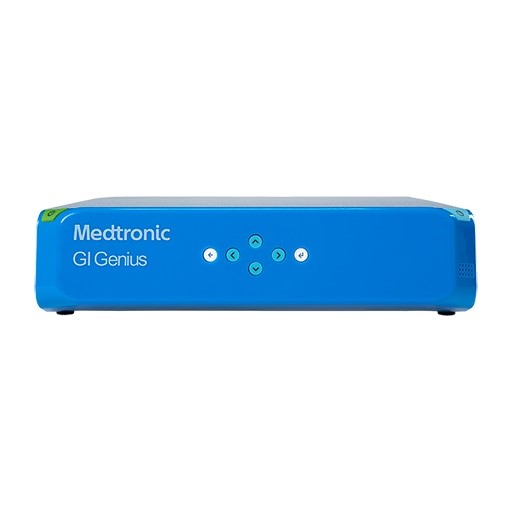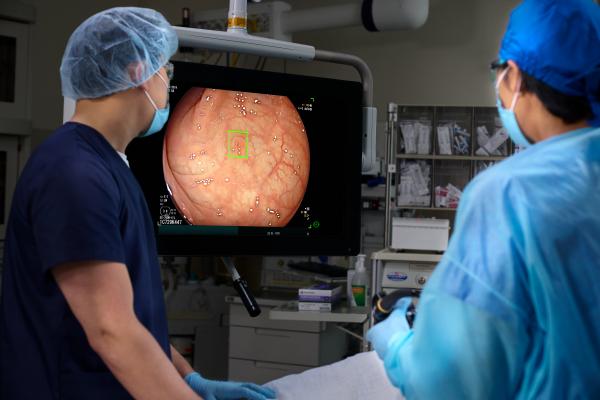Prestigious NHS AI award paves way for real-world trial of GI GeniusTM intelligent endoscopy module
Together with Kings College Hospital, Medtronic has been awarded £2.5 million of government funding for a large-scale, real-world trial of GI Genius in NHS hospitals around the UK. The...
Together with Kings College Hospital, Medtronic has been awarded £2.5 million of government funding for a large-scale, real-world trial of GI Genius in NHS hospitals around the UK.
The state-of-the-art system harnesses the power of Artificial Intelligence (AI) to help physicians detect colorectal lesions such as polyps and adenomas in the bowel that may become cancerous.
Bowel cancer is the UK’s second leading cause of cancer deaths and Medtronic’s GI Genius aims to help clinicians detect the suspicious lesions earlier – and improve patient outcomes.
Darin Wilson, Business Unit Leader Western Europe, Medtronic said: “Recent randomised controlled trials have shown the benefits that GI Genius brings to colonoscopy with nearly 50% reduction of adenoma miss rate.1
This award, which we are immensely proud to have won, will allow us to work in partnership with Kings College Hospital and the NHS to assess the technology in real-world conditions, in busy GI departments in the country. Bowel cancer kills more people in the UK than almost any other cancer and this trial will further our mission to detect early and improve patient outcomes.”
Largest real-world study
Medtronic is one of nine companies to share nearly £16 million award by the AI in Health and Care Awards, a collaboration between NHS AI Lab, the Accelerated Access Collaborative and the National Institute for Health and Care Research which provides funding to accelerate the testing and deployment of the most promising AI technologies.
The NAIAD trial (Nationwide study of Artificial Intelligence in Adenoma Detection for colonoscopy) will be the largest real-world study into the use of AI in gastroenterology in the NHS.
It will be led by King’s College Hospital NHS Foundation Trust and involve 4,000 colonoscopy patients being treated by gastroenterologists at 20 hospitals in England over two years. Medtronic will provide the GI Genius intelligent endoscopy module for the study and the first patients are expected to be treated in Autumn of 2023.
How “plug and play” device supports endoscopists to increase colonoscopy quality
Bowel cancer causes almost 17,000 deaths a year in the UK2. Colonoscopy is the gold-standard test for colorectal cancer screenings in which a small camera is used to check the health of the inside of the bowel. It is a critical tool in the early detection and prevention of bowel cancer.
GI Genius intelligent endoscopy module is the first AI device to be approved for clinical use in Europe and US to support endoscopists in detecting colorectal lesions during colonoscopy. GI Genius helps detect suspected lesions in real time and is trained to identify polyps of various shapes and sizes. It can even detect those polyps that can be difficult to spot and may have been easily missed.3 GI Genius never gets tired and supports the endoscopist to find colorectal lesions quickly and irrespective of those times of day when it has been shown that detection levels decrease due to endoscopist fatigue.
Great example of partnership
The NAIAD study will be run on a large scale and throughout multiple NHS hospitals to provide a ‘real world’ perspective of the potential impact of AI on endoscopy departments going about their day-to-day work. Data will be collected before the introduction of GI Genius, during its use and after its removal, allowing detection rates to be compared. The multi-centre pilot study will also assess the potential longer-term effect of using GI Genius to help gastroenterologists maintain or even augment their skills.
Giovanni di Napoli, President of Medtronic Gastrointestinal, which is part of the company’s Medical Surgical portfolio said: “The NAIAD trial is a great example of partnership with the NHS and aligns with one of the key aims of the NHS Long Term Plan – to improve cancer survival. It also illustrates Medtronic’s Gastrointestinal longstanding commitment to improve patient outcomes by empowering every gastroenterologist across the globe with AI and disruptive therapeutic technologies.”
Prof Bu Hayee, Consultant Gastroenterologist and Principal Investigator of the study at King’s College Hospital, said: “I’m pleased to be working on this project to establish whether the use of AI in colonoscopy might influence endoscopy performance and improve outcomes for patients.
There has never been a greater need for innovation in the NHS and this research may be able to shine a light on the possible benefits this technology can provide. Our NAIAD study is set to explore the use of AU in a ‘real world ‘setting and how it might influence endoscopists in their day-to-day practice.”
Contacts:
Sabrina Zimring
Public Relations
+1-720-774-3454
Ryan Weispfenning
Investor Relations
+1-763-505-4626
1 Wallace et Al. Impact of Artificial Intelligence on Miss Rate of Colorectal Neoplasia. Gastroenterology 2022;163:295–304
2 https://www.cancerresearchuk.org/health-professional/cancer-statistics/statistics-by-cancer-type/bowel-cancer
3 Repici A, Badalamenti M, Maselli R, et al. Efficacy of real-time computer-aided detection of colorectal neoplasia in a randomized trial. Gastroenterology. 2020;159:512–520.e7.


